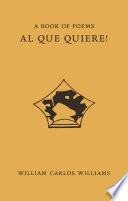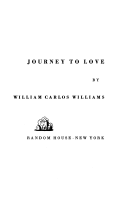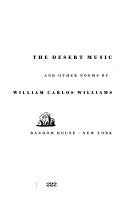Works

Al Que Quiere!
William Carlos Williams
Journey to Love
William Carlos Williams
Spring and All
William Carlos Williams
The Desert Music and Other Poems
William Carlos WilliamsPaterson
William Carlos Williams
The Autobiography of William Carlos Williams
William Carlos WilliamsSour Grapes
William Carlos WilliamsAn Early Martyr and Other Poems
William Carlos WilliamsPictures from Brueghel and Other Poems
William Carlos WilliamsFamous William Carlos Williams Quotes
Introduction
The Wedge (1944)
Context: A man isn’t a block that remains stationary though the psychologists treat him so — and most take an insane pride in believing it. Consistency! He varies; Hamlet today, Caesar tomorrow; here, there, somewhere — if he is to retain his sanity, and why not?
The arts have a complex relation to society. The poet isn’t a fixed phenomenon, no more is his work.
Source: The Collected Poems, Vol. 2: 1939-1962
William Carlos Williams Quotes about love
Journey to Love (1955), Asphodel, That Greeny Flower
“I lie here thinking of you: the stain of love is upon the world!”
"Love Song"
Al Que Quiere! (1917)
“Not now. Love itself a flower
with roots in a parched ground.”
"Raleigh Was Right" (1940)
Collected Later Poems (1950)
Context: Not now. Love itself a flower
with roots in a parched ground.
Empty pockets make empty heads.
Cure it if you can but
do not believe that we can live
today in the country
for the country will bring us
no peace.
William Carlos Williams Quotes about the trip
"Libertad! Igualidad! Fraternidad!"
Al Que Quiere! (1917)
Context: Brother!
— if we were rich
we'd stick our chests out
and hold our heads high! It is dreams that have destroyed us. There is no more pride
in horses or in rein holding. We sit hunched together brooding
our fate. Well —
all things turn bitter in the end
whether you choose the right or
the left way
and —
dreams are not a bad thing.
"Impromptu: The Suckers"
Collected Poems 1921-1931 (1934)
Annotations on John C. Thirlwell's copy of The Collected Earlier Poems (c. 1958)
General sources
“the set pieces
of your faces stir me —
leading citizens —
but not
in the same way.”
"Apology"
Al Que Quiere! (1917)
Letter to his mother, written from the University of Pennsylvania (12 February 1904), published in The Selected Letters of William Carlos Williams (1957) edited by John C. Thirlwall, p. 5
General sources
William Carlos Williams: Trending quotes
"El Hombre"
Al Que Quiere! (1917)
“But the hunted news I get from some obscure patients' eyes is not trivial. It is profound”
The Autobiography of William Carlos Williams (1951), Ch. 54: The Practice
General sources
Context: What is the use of reading the common news of the day, the tragic deaths and abuses of daily living, when for over half a lifetime we have known that they must have occurred just as they have occurred given the conditions that cause them? There is no light in it. It is trivial fill-gap. We know the plane will crash, the train be derailed. And we know why. No one cares, no one can care. We get the news and discount it, we are quite right in doing so. It is trivial. But the hunted news I get from some obscure patients' eyes is not trivial. It is profound: whole academies of learning, whole ecclesiastical hierarchies are founded upon it and have developed what they call their dialectic upon nothing else, their lying dialectics. A dialectic is any arbitrary system, which, since all systems are mere inventions, is necessarily in each case a false premise, upon which a closed system is built shutting out those who confine themselves to it from the rest of the world. All men one way or another use a dialectic of some sort into which they are shut, whether it be an Argentina or a Japan. So each group is maimed. Each is enclosed in a dialectic cloud, incommunicado, and for that reason we rush into wars and prides of the most superficial natures.
Do we not see that we are inarticulate? That is what defeats us.
“It is dreams that have destroyed us. There is no more pride
in horses or in rein holding.”
"Libertad! Igualidad! Fraternidad!"
Al Que Quiere! (1917)
Context: Brother!
— if we were rich
we'd stick our chests out
and hold our heads high! It is dreams that have destroyed us. There is no more pride
in horses or in rein holding. We sit hunched together brooding
our fate. Well —
all things turn bitter in the end
whether you choose the right or
the left way
and —
dreams are not a bad thing.
William Carlos Williams Quotes
“Why do we live? Most of us need the very thing we never ask for.”
Letter to Robert McAlmon (4 September 1943), published in The Selected Letters of William Carlos Williams (1957) edited by John C. Thirlwall, p. 217
General sources
Context: Why do we live? Most of us need the very thing we never ask for. We talk about revolution as if it was peanuts. What we need is some frank thinking and a few revolutions in our own guts; to hell with what most of the sons of bitches that I know and myself along with them if I don't take hold of myself and turn about when I need to — or go ahead further if that's the game.
“It's a strange world made up of disappointments for the most part.”
Letter to Robert McAlmon (8 August 1943), published in The Selected Letters of William Carlos Williams (1957) edited by John C. Thirlwall, p. 216
General sources
Context: It's a strange world made up of disappointments for the most part.
I keep writing largely because I get a satisfaction from it which can't be duplicated elsewhere. It fills the moments which otherwise are either terrifying or depressed. Not that I live that way, work too quiets me. My chief dissatisfaction with myself at the moment is that I don't seem to be able to lose myself in what I have to do as I should like to.
Introduction
The Wedge (1944)
Context: Each speech having its own character, the poetry it engenders will be peculiar to that speech also in its own intrinsic form. The effect is beauty, what in a single object resolves our complex feelings of propriety.
“Saxifrage is my flower that splits
the rocks.”
"A Sort of a Song"
The Wedge (1944)
Context: Let the snake wait under
his weed
and the writing
be of words, slow and quick, sharp
to strike, quiet to wait,
sleepless.
— through metaphor to reconcile
the people and the stones.
Compose. (No ideas
but in things) Invent!
Saxifrage is my flower that splits
the rocks.
“Such war, as the arts live and breathe by, is continuous.”
Introduction
The Wedge (1944)
Context: There is no poetry of distinction without formal invention, for it is in the intimate form that works of art achieve their exact meaning, in which they most resemble the machine, to give language its highest dignity, its illumination in the environment to which it is native. Such war, as the arts live and breathe by, is continuous.
It may be that my interests as expressed here are pre-art. If so I look for a development along these lines and will be satisfied with nothing else.
“Still, the profound change
has come upon them: rooted, they
grip down and begin to awaken.”
"Spring and All"
Spring and All (1923)
Context: Lifeless in appearance, sluggish
dazed spring approaches —
They enter the new world naked,
cold, uncertain of all
save that they enter. All about them
The cold, familiar wind — Now the grass, tomorrow
the stiff curl of wildcarrot leaf
One by one objects are defined —
It quickens: clarity, outline of leaf But now the stark dignity of
entrance — Still, the profound change
has come upon them: rooted, they
grip down and begin to awaken.
“If so I look for a development along these lines and will be satisfied with nothing else.”
Introduction
The Wedge (1944)
Context: There is no poetry of distinction without formal invention, for it is in the intimate form that works of art achieve their exact meaning, in which they most resemble the machine, to give language its highest dignity, its illumination in the environment to which it is native. Such war, as the arts live and breathe by, is continuous.
It may be that my interests as expressed here are pre-art. If so I look for a development along these lines and will be satisfied with nothing else.
“The War is the first and only thing in the world today.”
Introduction http://www.poetryfoundation.org/learning/essay/237888
The Wedge (1944)
Context: The War is the first and only thing in the world today.
The arts generally are not, nor is this writing a diversion from that for relief, a turning away. It is the war or part of it, merely a different sector of the field.
Introduction
The Wedge (1944)
Context: A man isn’t a block that remains stationary though the psychologists treat him so — and most take an insane pride in believing it. Consistency! He varies; Hamlet today, Caesar tomorrow; here, there, somewhere — if he is to retain his sanity, and why not?
The arts have a complex relation to society. The poet isn’t a fixed phenomenon, no more is his work.
“Why do I write today? The beauty of
the terrible faces
of our nonentities
stirs me to it”
"Apology"
Al Que Quiere! (1917)
Context: Why do I write today? The beauty of
the terrible faces
of our nonentities
stirs me to it: colored women
day workers—
old and experienced—
returning home at dusk,
in cast off clothing
faces like
old Florentine oak.
"To a Dog Injured in the Street"
The Desert Music and Other Poems (1954)
Context: I think
of the poetry
of René Char
and all he must have seen
and suffered
that has brought him
to speak only of
sedgy rivers,
of daffodils and tulips
whose roots they water,
even to the free-flowing river
that laves the rootlets
of those sweet-scented flowers
that people the
milky
way
Interview with Stanley Koehler (April 1962), in The Paris Review : Writers at Work, 3rd series, Viking Penguin, p. 29
General sources
Context: The art of the poem nowadays is something unstable; but at least the construction of the poem should make sense; you should know where you stand. Many questions haven't been answered as yet. Our poets may be wrong; but what can any of us do with his talent but try to develop his vision, so that through frequent failures we may learn better what we have missed in the past.
"Spring and All"
Spring and All (1923)
Context: Lifeless in appearance, sluggish
dazed spring approaches —
They enter the new world naked,
cold, uncertain of all
save that they enter. All about them
The cold, familiar wind — Now the grass, tomorrow
the stiff curl of wildcarrot leaf
One by one objects are defined —
It quickens: clarity, outline of leaf But now the stark dignity of
entrance — Still, the profound change
has come upon them: rooted, they
grip down and begin to awaken.
"To a Dog Injured in the Street"
The Desert Music and Other Poems (1954)
Context: The cries of a dying dog
are to be blotted out
as best I can.
René Char
you are a poet who believes
in the power of beauty
to right all wrongs.
I believe it also.
With invention and courage
we shall surpass
the pitiful dumb beasts,
let all men believe it,
as you have taught me also
to believe it.
Introduction
The Wedge (1944)
Context: When a man makes a poem, makes it, mind you, he takes words as he finds them interrelated about him and composes them — without distortion which would mar their exact significances — into an intense expression of his perceptions and ardors that they may constitute a revelation in the speech that he uses. It isn’t what he says that counts as a work of art, it’s what he makes, with such intensity of perception that it lives with an intrinsic movement of its own to verify its authenticity.
"A Sort of a Song"
The Wedge (1944)
Context: Let the snake wait under
his weed
and the writing
be of words, slow and quick, sharp
to strike, quiet to wait,
sleepless.
— through metaphor to reconcile
the people and the stones.
Compose. (No ideas
but in things) Invent!
Saxifrage is my flower that splits
the rocks.
"This Is Just to Say"
Collected Poems 1921-1931 (1934)
“Forgive me
they were delicious
so sweet
and so cold”
"This Is Just to Say"
Collected Poems 1921-1931 (1934)
Context: I have eaten
the plums
that were in
the icebox and which
you were probably
saving
for breakfast Forgive me
they were delicious
so sweet
and so cold
“It is difficult
to get the news from poems
yet men die miserably every day
for lack”
'of what is found there.'
Journey to Love (1955), Asphodel, That Greeny Flower
Source: Asphodel, That Greeny Flower and Other Love Poems: That Greeny Flower
“so much depends
upon a red wheel
barrow glazed with rain
water beside the white
chickens”
"The Red Wheelbarrow"
Source: Spring and All (1923)
“But the sea
which no one tends
is also a garden”
Source: Pictures from Brueghel and Other Poems
The Autobiography of William Carlos Williams (1951) [W. W. Norton & Co., 1967, ISBN 978-0811202268]
General sources
“Among
of
green stiff
old
bright broken
branch
come white
sweet
May again”
"The Locust Tree in Flower"
An Early Martyr and Other Poems (1935)
“So different, this man
And this woman:
A stream flowing
In a field.”
Poetry Chicago, 1916)
Marriage (1916)
Detail & Prosody for the Poem Patterson given to James Laughlin (1939), now at Houghton Library
General sources
"Impromptu: The Suckers"
Collected Poems 1921-1931 (1934)
“There's a lot of bastards out there!”
Remark (c. 1957), as quoted in the introduction to the poem "Death News" by Allen Ginsberg: Visit to W.C.W. circa 1957, poets Kerouac Corso Orlovsky on sofa in living room inquired wise words, stricken Williams pointed thru window curtained on Main Street: "There's a lot of bastards out there!"
General sources
On his work, in an interview in The New York Herald Tribune (18 January 1932)
General sources
“The earth cracks and
is shriveled up;
the wind moans piteously;
the sky goes out
if you should fail.”
"Chicory and Daisies"
Al Que Quiere! (1917)
Annotation on "Chicory and Daisies" (1915) on John C. Thirlwell's copy of The Collected Earlier Poems (c. 1958)
General sources
“Who shall say I am not
the happy genius of my household?”
"Danse Russe"
Al Que Quiere! (1917)
"Spring and All"
Spring and All (1923)
